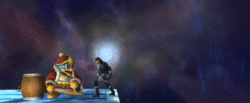Punishment: Difference between revisions
mNo edit summary |
mNo edit summary |
||
| Line 1: | Line 1: | ||
{{ArticleIcons|series=y}} | {{ArticleIcons|series=y}} | ||
[[File:Punishment Snake F-air Lag KO Brawl.gif|thumb|right|250px|An example of a punishment. The landing lag produced by {{SSBB|Snake}}'s [[forward aerial]] gives enough time for {{SSBB|King Dedede}} to | [[File:Punishment Snake F-air Lag KO Brawl.gif|thumb|right|250px|An example of a punishment. The landing lag produced by {{SSBB|Snake}}'s [[forward aerial]] gives enough time for {{SSBB|King Dedede}} to connect his [[dash attack]].]] | ||
'''Punishment''' is the act of attacking an opponent while they are vulnerable, usually from using an attack with slow start-up lag at a non-opportune time or having missed an attack with high ending lag. For example, the [[Falcon Punch]] is a punishable move since it has long start-up and ending lag; if Captain Falcon uses it against an active and expecting opponent or if the move's target is able to avoid the attack, they have ample time to launch a counterattack. Characters can also be punished if their attack is [[shield]]ed, such as via [[shield grab]]bing or [[Out of Shield|out of shield]] attacks. An attack that is difficult to punish is usually known as "safe", usually due to having low ending lag and/or large hitboxes that are difficult to get around. A move's power can make punishment seem more dangerous; some players may choose to avoid the forward smashes of {{SSBB|Ike}} and {{SSBB|King Dedede}} rather than attempt to punish them simply because of the risk involved. | '''Punishment''' is the act of attacking an opponent while they are vulnerable, usually from using an attack with slow start-up lag at a non-opportune time or having missed an attack with high ending lag. For example, the [[Falcon Punch]] is a punishable move since it has long start-up and ending lag; if Captain Falcon uses it against an active and expecting opponent or if the move's target is able to avoid the attack, they have ample time to launch a counterattack. Characters can also be punished if their attack is [[shield]]ed, such as via [[shield grab]]bing or [[Out of Shield|out of shield]] attacks. An attack that is difficult to punish is usually known as "safe", usually due to having low ending lag and/or large hitboxes that are difficult to get around. A move's power can make punishment seem more dangerous; some players may choose to avoid the forward smashes of {{SSBB|Ike}} and {{SSBB|King Dedede}} rather than attempt to punish them simply because of the risk involved. | ||
Revision as of 12:45, October 25, 2014

Punishment is the act of attacking an opponent while they are vulnerable, usually from using an attack with slow start-up lag at a non-opportune time or having missed an attack with high ending lag. For example, the Falcon Punch is a punishable move since it has long start-up and ending lag; if Captain Falcon uses it against an active and expecting opponent or if the move's target is able to avoid the attack, they have ample time to launch a counterattack. Characters can also be punished if their attack is shielded, such as via shield grabbing or out of shield attacks. An attack that is difficult to punish is usually known as "safe", usually due to having low ending lag and/or large hitboxes that are difficult to get around. A move's power can make punishment seem more dangerous; some players may choose to avoid the forward smashes of Ike and King Dedede rather than attempt to punish them simply because of the risk involved.
Characters can also be punished if they have used a move that causes helplessness, or they are in a position where their only recovery option is obvious and predictable.